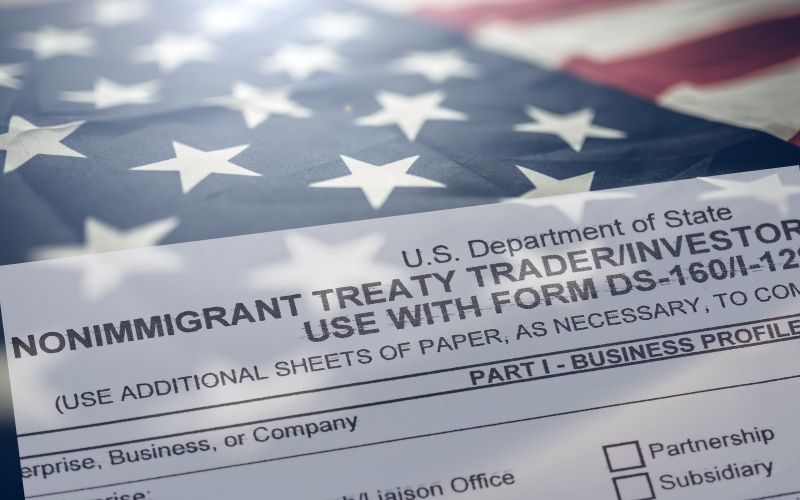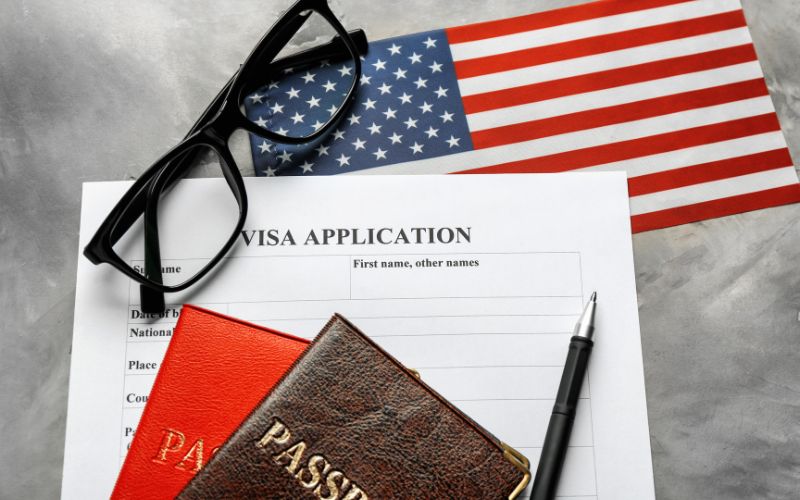Franchise Investors Visa for USA: Your Guide to E-2 Visa Success
Thinking about running a business and living in the U.S.? The franchise investors visa for USA, officially called the E-2 Treaty Investor Visa, could be your best move. It’s designed for people from treaty countries who want to invest in a business and live in the U.S.
Unlike the EB-5, the E-2 visa offers a faster, more flexible option for entrepreneurs with lower investment.
Franchises are a strong fit for the E-2 visa. They come with a proven business model, brand recognition, and support systems that can help new owners hit the ground running. Whether it’s a restaurant, cleaning service, or tutoring center, franchising can be a smart way to meet visa requirements and build a profitable business.
This guide will walk you through the E-2 visa basics, how it compares to other investor visas, and why franchising is a powerful strategy. We’ll cover what it takes to qualify, how to choose the right business, and what mistakes to avoid to begin your journey with confidence.
What is the U.S. Investor Visa?
The U.S. investor visa lets foreign nationals live and work in the U.S. by investing in or trading with American businesses. The main options include the EB-5 visa (a green card path requiring $800K–$1.05M and job creation) and the E-1 and E-2 visas (temporary visas for treaty country nationals engaged in trade or investing in U.S. businesses).
Immigration services play a crucial role in processing these visas, ensuring compliance with U.S. Citizenship and Immigration Services (USCIS) protocols, and managing applications and eligibility.
Immigrant vs. Non-Immigrant Visas
The EB-5 is an immigrant visa, ideal for those planning to apply for lawful permanent residence. E-1 and E-2 are non-immigrant visas—great for running a business or trade operation in the U.S., but without automatic green card benefits.
Extensions are allowed, but permanent resident status isn’t guaranteed. The EB-5 visa offers a pathway to permanent residency through compliance with U.S. Citizenship and Immigration Services with investment requirements and job creation.
Who Counts as an Investor?
EB-5 investors must invest lawfully sourced funds and meet job creation requirements by creating 10 U.S. jobs. E-2 investors typically invest $100K+ and must own or control at least 50% of the business. E-1 applicants focus on substantial international trade with no set investment amount. All must actively direct their U.S. enterprise.
E Visa Types Explained

The E visa category includes two key non-immigrant options for foreign nationals from treaty countries: the E-1 Treaty Trader Visa and the E-2 Treaty Investor Visa. While both allow for business activity in the U.S., they serve different purposes, trade versus investment, and come with distinct eligibility criteria and operational requirements.
Additionally, the EB-5 visa is part of the immigrant investor program established by the U.S. Congress to promote foreign investment in American businesses and facilitate job creation.
E-1 Treaty Trader Visa: For International Trade Operators
The E-1 visa is designed for individuals or companies from treaty countries that conduct substantial trade with the U.S. Over 50% of the company’s international trade must be between the U.S. and the treaty country to qualify.
This trade can involve goods, services, banking, and insurance, but it must be regular, continuous, and significant in volume.
The applicant and the business must share the nationality of a treaty country. E-1 visas aren’t limited to company owners—employees with executive, supervisory, or essential skills may also qualify if the business meets the trade criteria. However, the business must be actively engaged in trade, not just an entity created on paper.
E-2 Treaty Investor Visa: For Business Builders and Owners
The E-2 visa allows nationals from treaty countries to develop and direct a business in which they’ve made a substantial investment. There’s no fixed dollar minimum, but the direct investment funds must be large enough to ensure business success, typically $100,000 or more, depending on the industry.
To qualify, investors must show that the funds are “at risk”—already committed and subject to loss. They must also demonstrate control of the business, usually by owning at least 50% or having a key management role. This is similar to the direct investment requirement in the EB-5 visa program, where investors must manage their business actively.
The business must be real, active, and not marginal, meaning it must generate more than just a living for the investor and ideally create jobs or economic impact. Employees with essential skills may also be eligible under this visa if they’re critical to the operation.
Why Choose the E-2 Treaty Investor Visa?

The E-2 Treaty Investor Visa offers a strategic pathway for individuals from treaty countries to actively manage and grow a new commercial enterprise in the United States.
For entrepreneurs seeking a faster, more flexible alternative to the EB-5 program, the E-2 visa can be a smart move—without requiring a million-dollar price tag. However, unlike the EB-5 visa, which offers a pathway to becoming a permanent resident, the E-2 visa does not lead directly to permanent residency.
Lower Capital Investment Requirement Than EB-5
One of the standout advantages of the E-2 visa is its significantly lower capital investment threshold compared to the EB-5 Immigrant Investor Visa. While EB-5 applicants must invest at least $1,000,000—or $500,000 in a targeted employment area—the E-2 visa has no set minimum. Instead, it requires a qualifying investment that is “substantial” relative to the business.
In real terms, many successful E-2 applicants invest between $100,000 and $200,000 in businesses that align with the fair market value of operations. This makes the E-2 a much more accessible option for investors looking to launch or acquire a small to mid-sized U.S. business.
Faster Processing Through U.S. Consulates
Forget the multi-year waits often associated with green cards. The E-2 visa application is typically submitted directly to a U.S. Consulate, skipping lengthy reviews by U.S. Citizenship and Immigration Services USCIS or the National Visa Center.
This consular processing often results in decisions within weeks or a few months, significantly reducing time-to-market. The visa is renewable indefinitely, provided the commercial enterprise continues to meet all visa conditions, such as maintaining active operations and fulfilling the job creation requirement over time.
Benefits for Family Members
The E-2 visa doesn’t just open doors for the investor—it brings benefits for family members as well. Spouses of E-2 holders are eligible for automatic work authorization, meaning they can accept employment or even start their own business without jumping through extra hoops.
Meanwhile, unmarried children under 21 can accompany the investor and are free to attend U.S. schools and universities—an educational advantage that adds long-term value to the investment decision.
Flexibility to Launch or Acquire a Business
The E-2 visa is uniquely flexible. Investors can either start a new venture or acquire an existing business, provided they make a qualifying investment in new commercial enterprises, and the enterprise isn’t considered “marginal.”
In other words, the business must do more than just support the investor—it should contribute to economic growth and create jobs for U.S. workers. This flexibility allows investors to align their visa strategy with their business goals and industry experience.
Franchise Investments: A Strong Strategic Fit
Franchises are often a perfect match for the E-2 visa structure. Investing in a franchise allows E-2 applicants to tap into a proven commercial enterprise model—complete with operational playbooks, brand recognition, and ongoing franchisor support.
These elements can provide a competitive edge when demonstrating business viability and return on investment funds to consular officers. For many investors, franchises offer a lower-risk entry point with scalability baked in.
Franchising and the E-2 Visa: A Smart Way to Enter the US Market

For E-2 Treaty Investors, franchising can be a structured and efficient way to launch a business in the United States. The franchise model often aligns with the E-2 requirements and can help build a qualifying commercial enterprise more quickly.
Why Franchises Work for E-2 Visa Investors
Immigration authorities evaluate E-2 applications on business viability, investor involvement, and economic contribution. Franchises meet these expectations in multiple ways.
Proven Business Models
Franchises are built on established systems with a track record of success. This built-in infrastructure – marketing strategies, brand recognition, and operational consistency – helps the investors’ case by showing a viable, revenue-generating business. This is key to demonstrating that the business meets the job creation requirement and contributes to economic growth.
Training and Ongoing Support
Franchisors provide comprehensive training and ongoing operational support, which can show the investor is well-equipped to run the business. This structured support means even those with no prior experience in the industry can succeed long-term.
Easier to Validate Business Viability
With a franchise, much of the work to prove business legitimacy is already done. The Franchise Disclosure Document (FDD) provides financial history, legal context, and performance data.
This makes it easier to show the business is real, operating, and not marginal (i.e. can generate more than minimal income for the investor and their family members).
Strong Franchise Sectors for E-2 Investors
While the E-2 visa allows flexibility in industry choice, certain sectors have consistently proven to be strong contenders due to their reliability and demand:
- Food and Beverage: Restaurants, cafes, and quick-service food franchises offer accessible business models and consistent consumer demand.
- Home Services: Cleaning, maintenance, and repair businesses often demonstrate durability and steady need in residential and commercial markets.
- Fitness and Wellness: Gyms and wellness centers are aligned with growing interest in health, offering recurring revenue opportunities.
- Education and Tutoring: Academic support and test preparation services meet ongoing needs across communities and age groups.
Choosing the Right Franchise: What Really Matters

Picking the right franchise isn’t just a business decision—it’s also key to getting your E-2 visa approved. This is your money, your future, and potentially your family’s path to a new life in the U.S., so it’s worth getting it right. Here are a few things to think about before diving in.
Look Beyond the Franchise Fee
The upfront franchise fee is just one piece of the puzzle. You’ll also need to budget for startup costs like equipment, renovations, working capital, and even your own living expenses while the business ramps up.
Immigration officials will look at your total capital investment—not just the fee—to make sure it’s substantial and fully committed. The investment should match the real cost of launching and running the business.
Know Your Role in the Business
The E-2 visa isn’t for silent partners. You need to be involved in the day-to-day operations or at least play a hands-on management role. Some franchises expect you to be there every day.
Others give you more flexibility, but you have to be actively steering the ship. The key is showing you’re in charge and driving the business forward.
Choose a Strong Location and Scalable Model
Where you set up shop matters. Think about who your customers will be, what the local competition looks like, and whether the area can support your business long-term. Franchises that allow room for growth, like opening more locations later, can strengthen your visa case and increase your earning potential.
Watch Out for These Common Mistakes
Even with a great franchise, a few missteps can put your business—and your visa—at risk. Avoid these pitfalls:
Skipping the Homework
Don’t just fall in love with the brand. Dig into the Franchise Disclosure Document (FDD), study the financials, and ask hard questions. It helps to work with professionals who know both franchising and immigration law so you understand exactly what you’re getting into.
Underestimating What It’ll Cost
A lot of new investors focus on the initial fees and forget about everything else. Make sure you’ve got enough set aside to run the business and cover your personal expenses for at least the first year. Underfunding your venture is one of the fastest ways to run into trouble.
Trying to Stay Hands-Off
The E-2 visa does not support passive investments. If you plan to just invest and let someone else run the show, your application will likely be denied. You need to be directly involved and ready to show it.
Choosing a Business That’s Too Small
Your business needs to do more than just pay your bills. Immigration officers will look at whether it creates jobs or has a broader impact on the U.S. economy. If it’s barely getting by or just supports you alone, that won’t cut it.
Launching Your American Dream Through Franchising
Franchising is one of the most accessible ways for foreign investors to start a business in the U.S.—and build a future while they’re at it. Thanks to the E-2 visa, you don’t just invest and hope for the best. You get to take the reins of a real, operating business.
And with many franchise systems offering structured training, brand recognition, and operational support, the leap into U.S. entrepreneurship feels a lot less daunting.
That said, navigating the process takes more than just ambition. From understanding the minimum investment needed—often around $100,000 or more—to making sure your business plan checks every immigration box, there are a lot of moving parts. This is where having the right team around you really pays off.
If you’re serious about turning your investment into a long-term opportunity in the U.S., don’t go it alone. Talk to a franchise expert and E-2 visa consultant who knows what it takes. With smart guidance and a solid plan, your American dream might be closer than you think.